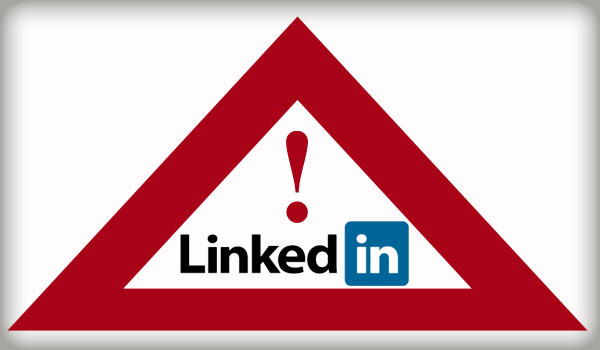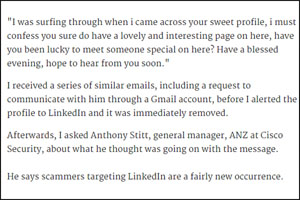Linkedin Scams
Protect yourself from LinkedIn scams with insights on spotting fraudulent profiles, avoiding job offer scams, and securing your online professional network. Stay informed to safeguard your personal and career information from phishing and identity theft on LinkedIn.
 Scammers are expanding their reach and employing new strategies on social media platforms, so be
vigilant! LinkedIn, a r grobusiness-oriented social networking
service, is now a platform where crooks attempt to defraud individuals of their money or identity. The
dynamic nature of social media not only facilitates
connections but also poses risks, as it introduces users to new people who may be foes rather than
friends.
Scammers are expanding their reach and employing new strategies on social media platforms, so be
vigilant! LinkedIn, a r grobusiness-oriented social networking
service, is now a platform where crooks attempt to defraud individuals of their money or identity. The
dynamic nature of social media not only facilitates
connections but also poses risks, as it introduces users to new people who may be foes rather than
friends.
LinkedIn invite scams
At times, individuals may become confirmed members of your LinkedIn
group, falling victim to scams. It's crucial to stay
cautious and be aware of potential scams, especially on professional networking platforms like LinkedIn.
Without your final approval, you can be caught up in invite scams. Standard groups typically permit members to request connections and approve requests to join. Therefore, when managing groups, ensure that you thoroughly vet each member. In some instances, scammers send deceptive emails expressing a desire to add you to their professional network on LinkedIn. If you click the confirm button, it redirects you to a malicious website that downloads malware onto your computer. Beware of fake profiles and email warning scams. Stay vigilant to protect your online security.
Romance scam in LinkedIn
LinkedIn, a networking tool designed to connect professionals globally for enhanced productivity and
success, is not immune to exploitation by scam artists who
leverage the allure of romance to trap vulnerable users.
Below is a screenshot illustrating a
LinkedIn user receiving a fake romantic message in her LinkedIn
inbox. The message reads as follows:
Remaining vigilant and well-informed is crucial to avoid pitfalls that can not only drain your finances but also disrupt the happiness and peace in your life.
Inheritance Scam Tactics
This is another age-old trick, now presented in a more sophisticated form. It involves offering you a
false promise of inheritance to trick you into parting with your
wealth or sharing your bank or credit card details.
The scam artist, posing as a lawyer, banker, or
another foreign official, claims that you've inherited millions of
dollars from a deceased relative, and since the deceased left no other beneficiaries, they insist that
you are legally entitled to claim the inheritance. They will go to
great lengths to persuade you that a fortune awaits if you follow their instructions, which typically
involve providing sensitive personal details. Following their
instructions not only puts your money at risk but also leaves you vulnerable to identity theft.
Beware of Fake Job Offers on LinkedIn
Not all job offers that land in your LinkedIn inbox are legitimate. Some scammers pose as job recruiters, presenting enticing details of high-paying positions that can supposedly be performed from anywhere. They often reassure users that the offer is 100% legitimate to quell any skepticism. However, when payday arrives, the scammers disappear, and no paycheck materializes. The next time you receive a job offer through LinkedIn, exercise caution and thoroughly vet the opportunity. Consider focusing on reputable job portals to find genuine employment opportunities and avoid falling victim to job scams.
Identifying Red Flags on LinkedIn
- Messages requesting personal details and urging immediate action.
- Communications with poor spelling and grammar that lack personalization.
- Messages urging you to open attachments for software installations.
Enhance your security measures and exercise caution if you receive a suspicious message. Avoid clicking on any links; instead, visit linkedin.com directly using your web browser's address bar to verify contact and message details. If you suspect you've encountered a scam on LinkedIn, report it to your local law enforcement to help prevent further fraudulent activities.
Beware of the LinkedIn "Confirm Email Address" Scam
Be cautious if you receive an email claiming to be from LinkedIn asking you to confirm your email address, as it may be a phishing scam. The intention of online scammers behind such emails is to deceive LinkedIn users into disclosing their account login passwords.
Example(LinkedIn Scammers Mail)
If you click the link provided in the email, it may redirect you to a fraudulent website that mimics a genuine LinkedIn login page. Upon entering your login credentials on this fake site, you unwittingly provide the scammers with your LinkedIn login ID and password. Subsequently, they can gain unauthorized access to your account. Once inside, scammers may exploit your account to initiate spam or scam campaigns in your name, potentially causing harm to your professional reputation.







